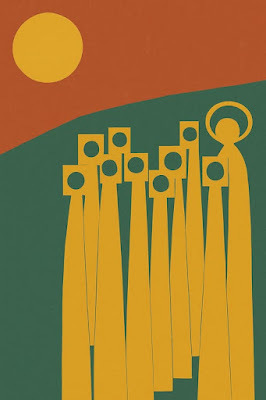All Saints Sunday

November 2,2025
+ Yesterday—November1—was, of course, All Saints Day.
It is one of the mostvery important days in the Church.
It is the day inwhich we commemorate all the saints who now dwell with God in heaven.
It is a beautifulfeast.
And we, here at St.Stephen’s, have been celebrating this feast day for a few weeks already.
We celebrated severalnew saints.
Well, kinda newsaints.
New saints to us,anyway.
Over these last fewweeks we have been burying the ashes of several individuals whose ashes wereunclaimed, some for over 40 years.
(Your priest has beenbusy digging graves over these past weeks—something they do not teach a priestto do in seminary).
And today, we will doit again.
After our Eucharisttoday, we will process out at the end of the service to our memorial garden,and we will bury the ashes of George Smith.
George died onFebruary 19, 1984.
1984.
Just think about thatfor a moment.
I’m going to read youhis obituary
From theFargo Forum,Tues,. Feb. 21, 1984
George E. Smith
George E. Smith, 62, 839 23rdAve. S., Moorhead, died Sunday.
Mr. Smith was born Jan. 29, 1922,at Brantford, Ont, and received a master's degree from the University ofBritish Columbia. He was assistant professor of education at the University ofVictoria and at Moorhead State University from 1968 to 1980. He marriedRosemary N. June 12, 1967, at Seattle.
He is survived by his wife; twosons and two daughters, three who lived in Bellevue, Wash., and a another wholived in Seattle.
It seems Rosemary moved shortly afterhis death to Tacoma without claiming his ashes.
There appears to have been nofuneral, no memorial service for him.
(until today—41 years later)
Just cremated.
And 41 years on a shelf at KorsmoFuneral Home.
He was just kind of forgotten.
Until now.
Now he isone of our own.
He alongwith Thomas (a homeless man who also died in 1984), Baby Matthew (who died inDecember 1986) and Kimberly (who died in 2023 and whose ashes were buriedlast Wednesday), are now a part of our community.
And areminder that we are all part of the community of saints in this world and the next.
We Episcopalians dothese things well.
We do funerals well,we do commemorating our deceased loved ones well.
We celebrate thesaints—those who are both well-known saints and those saints who might only beknown to a few—very well as Episcopalians.
And when anyone fromSt. Stephen’s dies, or when anyone close to someone at St. Stephen’s dies, youwill always receive an email with a request for prayer.
And the request forprayer will usually begin with these words:
“The prayers of St.Stephen’s are requested for the repose of the soul of …so-and-so.”
Occasionally, someonewill ask me about that prayer request.
Someone will ask,
Why do we prayfor the dead?
Why do we prayfor the repose of their souls?
After all,they’ve lived their lives in this world and wherever they’re going, they’rethere long before a prayer request goes out.
It’s a good question.
The fact is, we DOpray for our dead.
We always have—asAnglicans and as Episcopalians.
You will hear us asEpiscopalians make the petition for prayer when someone dies that you won’thear in the Lutheran Church, or the Methodist Church or the PresbyterianChurch.
Praying in such a wayfor people who have passed has always been a part of our Anglican tradition,and will continue to be a part of ourtradition.
And I can tell you,I like that idea of praying for thosewho have died.
But, I want tostress, that although we and Roman Catholics both pray for our dead, we don’t pray for people have died for thesame reasons Roman Catholics do.
In other words, wedon’t pray to free them from some sort of mythical purgatory, as though ourprayers could somehow change God’s mind.
I want to stress thatour prayers do NOT change God’s mind!
Rather, we pray forour deceased loved ones in the same way we pray for our living loved ones.
We pray for them toconnect, through God, with them.
We pray to rememberthem and to wish them peace.
Still, that might notbe good enough answer for some (and that’s all right).
So…let’s hear whatthe Book of Common Prayer says about it.
And, yes, the Book ofCommon Prayer does address this very issue directly.
I am going to haveyou pick up your Prayer Books and look in the back, to the Catechism.
There, on page 862 you get the very important question:
Why do we prayfor the dead?
The answer (andit’s very good answer): “We pray for them, because we still hold them in ourlove, and because we trust that in God's presence those who have chosen toserve [God] will grow in [God’s] love, until they see [God] as [God] is.”
That is a greatanswer!
We pray thatthose who have chosen to serve God will grow in God’s love.
So,essentially, just because we die, it does not seem to mean that we stop growingin God’s love and presence.
I think that iswonderful and beautiful.
And certainlyworthy of our prayers.
But even more so thanthis definition, I think that, because we are uncertain of exactly what happensto us when we die, there is nothing wrong with praying for those who havecrossed into that mystery we call “the nearer Presence of God.”
After all, they arestill our family and friends.
We still love them!
They are still partof who we are.
Now, I know that thisidea of praying for those who have died makes some of us very uncomfortable.
And I understand why.
I understand that it flies in the face of some of our more Protestantupbringings.
This is exactly whatthe other Reformers rebelled against and “freed” us from.
But, even they neverdid away with this wonderful All Saints Feast we are celebrating this morning.
This morning we are commemorating and remembering those people in our lives whohave helped us, in various way, to know God.
As you probably haveguessed from the week-long commemoration we do here at St. Stephen’s regardingthe Feast of All Saints, I really do love this feast.
With the death of many of my own loved ones in these last few years, this Feasthas taken on particular significance for me.
What this feast showsme is what you have heard me preach in many funeral sermons again and again.
I truly, without adoubt, believe that what separates those of us who are alive here on earth,from those who are now in the “nearer presence of God” is truly a very thinone.
And to commemoratethem and to remember them is a good thing for all us.
Now, I do understand, as I said before, that all this talk of saints makes someof us a bit uncomfortable.
But…I do want us tothink long and hard about the saints we have known in our lives.
And we have all knownsaints in our lives.
We have known thosepeople who have shown us, by their example, by their goodness, that God worksthrough us.
And I want us to atleast realize that God still works through us even after we have departed fromthis mortal coil.
Ministry in one formor the other, can continue, even following our deaths.
Our witness hasfollowers of Jesus can continue on.
Hopefully, we canstill, even after our deaths, do good and work toward furthering the Kingdom ofGod by the example we have left behind.
For me, the saints—those people who have gone before us—aren’t gone.
They haven’t justdisappeared.
They haven’t justfloated away and dissipated like clouds out of our midst.
No, rather they arehere with us, still.
In these last fewyears, after losing so many people in my family and among close friends, Ithink I have felt their presence most keenly many times, but often times most keenlyhere at this altar when we are gathered together for the Eucharist then at anyother time.
I have felt them herewith us.
And in those momentswhen I have, I know in ways I never have before, how thin that veil is betweenus and “them.”
You can see why Ilove this feast.
It not only gives usconsolation in this moment, separated as we are from our loved ones, but italso gives us hope.
We know, in momentslike this, where we are headed.
We know what awaitsus.
No, we don’t know itin detail.
We’re not sayingthere are streets paved in gold or puffy clouds with chubby little babyangels floating around.
We don’t have a clearvision of that place.
But we do sense it.
We do feel it.
We know it’s there,just beyond our vision, just out of reach and out of focus.
And “they” are allthere, waiting for us.
They—all the angels,all the saints, all our departed loved ones.
And so too are Thomas and Baby Matthew and Kim Meissner and George.
So, this morning—andalways—we should rejoice in this fellowship we have with them.
We should rejoice asthe saints we are and we should rejoice with the saints that have gone beforeus.
In our collect thismorning, we prayed that “we may come to those ineffably joys that you haveprepared for those who truly love you.”
Those ineffably joysawait us.
They are there, juston the other side of that thin veil.
We too will live withthem in that place of unimaginable joy and light.
WE are all the saintsof God, here and now.
And that is a reasonto rejoice this morning.



